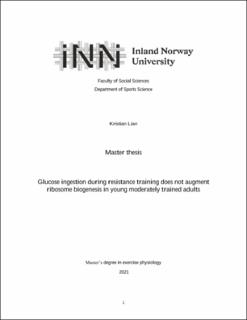Glucose ingestion during resistance training does not augment ribosome biogenesis in young moderately trained adults
Master thesis
Permanent lenke
https://hdl.handle.net/11250/2839348Utgivelsesdato
2021Metadata
Vis full innførselSamlinger
Sammendrag
Introduction: Responses to resistance training (RT) are not uniform across the population, and individuals responding poorly to RT show a blunted ability to produce novel ribosomes. High glucose treatment has been observed to augment rDNA transcription, however its effect on RTinduced adaptations remains quite unexplored.
Methods: Sixteen healthy moderately trained participants were included and randomized to having one leg perform unilateral resistance training with glucose supplement (16) and the other with placebo (16), alternating training every other day. Participants remained in an overnight fasted state, only receiving glucose/placebo and protein until after completion of the daily intervention. Resistance training consisted of 3 sets of 10 repetitions maximum unilateral leg press and knee extension. Micro biopsies were sampled pre (T1/T2) and post (T3/T4) the intervention, and maximal unilateral isometric and isokinetic knee extension force and torque were measured pre (T0), during (days 4, 5, 8, 9) and post (T3/T4, day 13) the intervention.
Results: There were no difference in accumulation of total RNA (p = 0.499) between glucose and placebo (26% and 22% increase, respectively). This was also evident in expression of mature rRNA (18S: p = 0.584, 28S: p = 0.740, 5.8S: p = 0.935, 5S: p = 0.790, 47S: p = 0.502), despite a robust increase in both glucose and placebo (34-43% and 33-41%, respectively). Furthermore, there were no differences between glucose and placebo in mean maximal unilateral isometric knee extension force and isokinetic peak torque during the intervention (Isometric: p = 0.336, 240 d/s: p = 0.527) and following last RT session (Isometric: p = 0.442, 60 d/s: p = 0.377, 240 d/s: p = 0.154), with the exception of the 60 d/s test prior to last RT session (p = 0.037).
Conclusion: Based on our findings, glucose supplement during RT does not augment RTinduced ribosome biogenesis compared to placebo supplement, nor does it affect peak torque during a five-session RT intervention, or enhance muscular recovery following a single session of RT.
